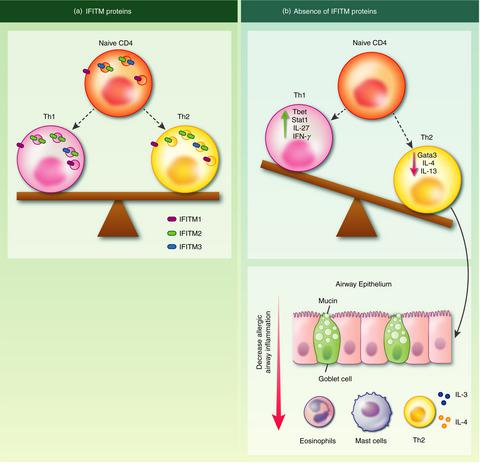当前位置:
X-MOL 学术
›
Immunology
›
论文详情
Our official English website, www.x-mol.net, welcomes your feedback! (Note: you will need to create a separate account there.)
The IFITM protein family in adaptive immunity.
Immunology ( IF 6.4 ) Pub Date : 2019-12-22 , DOI: 10.1111/imm.13163 Diana C Yánez 1, 2 , Susan Ross 1 , Tessa Crompton 1
Immunology ( IF 6.4 ) Pub Date : 2019-12-22 , DOI: 10.1111/imm.13163 Diana C Yánez 1, 2 , Susan Ross 1 , Tessa Crompton 1
Affiliation

|
Interferon-inducible transmembrane (IFITM) proteins are a family of small homologous proteins, localized in the plasma and endolysosomal membranes, which confer cellular resistance to many viruses. In addition, several distinct functions have been associated with different IFITM family members, including germ cell specification (IFITM1-IFITM3), osteoblast function and bone mineralization (IFITM5) and immune functions (IFITM1-3, IFITM6). IFITM1-3 are expressed by T cells and recent experiments have shown that the IFITM proteins are directly involved in adaptive immunity and that they regulate CD4+ T helper cell differentiation in a T-cell-intrinsic manner. Here we review the role of the IFITM proteins in T-cell differentiation and function.
中文翻译:

IFITM蛋白家族具有适应性免疫。
干扰素诱导跨膜(IFITM)蛋白是一类小同源蛋白,位于血浆和溶酶体膜中,赋予细胞对许多病毒的抗性。此外,几种不同的功能已与不同的IFITM家族成员相关联,包括生殖细胞规格(IFITM1-IFITM3),成骨细胞功能和骨矿化(IFITM5)和免疫功能(IFITM1-3,IFITM6)。IFITM1-3由T细胞表达,最近的实验表明,IFITM蛋白直接参与适应性免疫,它们以T细胞内在的方式调节CD4 + T辅助细胞的分化。在这里,我们回顾了IFITM蛋白在T细胞分化和功能中的作用。
更新日期:2020-03-26
中文翻译:

IFITM蛋白家族具有适应性免疫。
干扰素诱导跨膜(IFITM)蛋白是一类小同源蛋白,位于血浆和溶酶体膜中,赋予细胞对许多病毒的抗性。此外,几种不同的功能已与不同的IFITM家族成员相关联,包括生殖细胞规格(IFITM1-IFITM3),成骨细胞功能和骨矿化(IFITM5)和免疫功能(IFITM1-3,IFITM6)。IFITM1-3由T细胞表达,最近的实验表明,IFITM蛋白直接参与适应性免疫,它们以T细胞内在的方式调节CD4 + T辅助细胞的分化。在这里,我们回顾了IFITM蛋白在T细胞分化和功能中的作用。



























 京公网安备 11010802027423号
京公网安备 11010802027423号